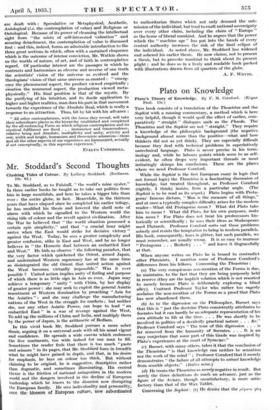Mr. Stoddard's Second Thoughts
Clashing Tides of Colour. By Lothrop Stoddard. (Scribners. 10s. 6d.) To Mr. Stoddard, as to Falstaff, "the world's mine oyster." In three earlier books he taught us to take our politics from him in large mouthfuls, and here he takes a bigger bite than ever : the entire globe, in fact. Meanwhile, in the thirteen years that have elapsed since he completed his earlier trilogy, he has modified his thesis and lowered the shrill note of alarm with which he signalled to the Western world the rising tide of colour and the revolt against civilization. After the War he believed that "the world situation possessed a certain epic simplicity," and that "a crucial hour might arrive when the East would strike for decisive victory" against the West. Today, he sees a greater complexity and greater confusion, alike in East and West, and he no longer believes in "the Homeric duel between an embattled East and West." He bids us observe " the following paradox, that the _very factor which quickened the Orient, armed Japan, and undermined Western supremacy has at the same time so disintegrated the old Orient that united action against the West becomes virtually impossible." Was it ever possible ? United action implies unity of feeling and purpose of which there is as little sign in Asia as ever. Japan may achieve a temporary ." unity" with China, by her display of greater power : she may seek to exploit the general Asiatic resentment at Western domination by preaching "Asia for the Asiatics " : and she may challenge the manufacturing nations of the West in the struggle for markets ; but neither she, nor any other Asiatic Power, can hope to lead "an embattled East" in a war of revenge against the West. To add up the millions of China and India, and multiply them by the power of Japan, is the arithmetic of Bedlam.
• In this vivid book Mr. Stoddard pursues a more sober thesis, arguing it on a universal scale with all his usual vigour and confidence. He spreads a wide canvas which embraces the five continents, too wide indeed for one man to fill. Sometimes the reader feels that there is too much "paste and scissors" in its pages, that Mr. Stoddard loses in breadth what he might have gained in depth, and that, in his desire for emphasis, he lays on colour too thick. But without claiming to be original, he is suggestive, descriptive rather than dogmatic, and sometimes illuminating. His central theme is the friction of national antagonism in the modern world and the dangers involved in the decline of European leadership which he traces to the disunion now disrupting the European family. He sees individuality and personality, QaCC the. blossom of European culture, now subordinated
to authoritarian States which not only demand the sub- mission of the individual, but tend to exalt nations/ sovereignty over every other claim, including the claim of " Europe " as the home of liberal mankind. And he argues that the power which the "machine age" has put into the hands of every central authority increases the risk of the final eclipse of the individual. As noted above, Mr. Stoddard has widened and sobered his earlier thesis. He now claims, not to present a thesis, but to provoke mankind to think about its present plight ; and he does so in a lively and readable book packed with illustrations drawn from all quarters of the globe.
A. F. WHYTE.










































 Previous page
Previous page